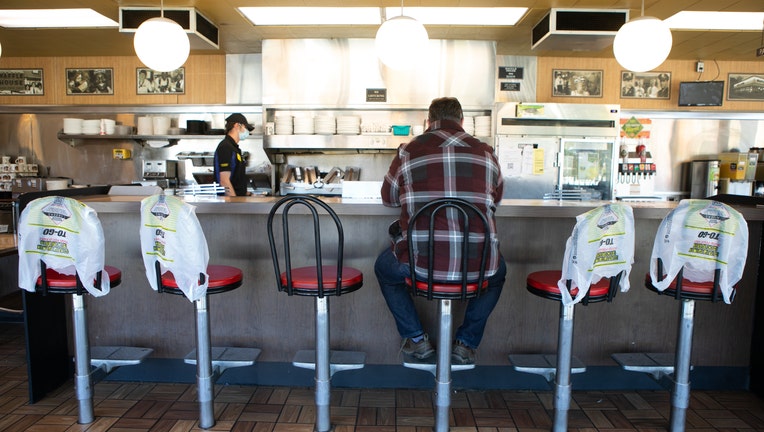Social distancing, prevention tips to remember as Florida enters phase one of reopening

FILE - Ron Flexon sits at the counter for dine-in service while other seats are marked off for social distancing protocol at the Waffle House on April 27, 2020 in Brookhaven, Georgia. (Photo by Jessica McGowan/Getty Images)
ORLANDO, Fla. - Florida, with the exception of Miami-Dade, Broward, and Palm Beach Counties, has entered phase one of reopening amid the ongoing coronavirus pandemic.
With this phase, restaurants and retail stores can reopen with limited capacity. Restaurants can offer outdoor seating with six-foot spacing between tables and indoor seating is limited to 25-percent capacity. Retail stores can also operate at 25-percent of indoor capacity.
In addition, Governor Ron DeSantis is allowing Florida's state parks to reopen. Places like gyms, barbershops, bars, nightclubs, and entertainment venues will remain closed under phase one.
However, with things reopening, more people are bound to go out. Phase one still advises social distancing, as COVID-19 can spread quickly from person to person most frequently among close contact within 6 feet of someone who is infected, the CDC says.
Here are some social distancing tips:
- Be mindful on trips to the grocery store, and when picking up take out, medication or having food delivered to your house. Stay 6 to 8 feet away from others and be aware that COVID-19 can spread from contact with contaminated surfaces.
- All individuals, when in public, should maximize physical distance from others.
- Keep six to eight feet of distance when going outside to get some fresh air.
- Avoid socializing in groups of more than 10 people in circumstances that do not readily allow for physical distancing.
- Face coverings are recommended in all face-to-face interactions.
- Vulnerable individuals should avoid close contact with people outside of the home.
MORE NEWS: CDC adds 6 new symptoms of coronavirus to list
Even with social distancing though, it is important to remember to practice good hygiene, as it will help prevent you from getting and spreading COVID-19.
Here are some prevention tips:
- According to the U.S. Centers for Disease Control and Prevention, thorough hand-washing is a pivotal part of preventing the transmission of viruses, including coronavirus. You should wash your hands, and you should wash them often.
- Follow these five steps when you wash: Wet your hands with clean, running water (warm or cold), turn off the tap, and apply soap. Lather your hands by rubbing them together with the soap. Lather the backs of your hands, between your fingers, and under your nails. Scrub your hands for at least 20 seconds. Need a timer? Hum the “Happy Birthday” song from beginning to end twice. Rinse your hands well under clean, running water. Dry your hands using a clean towel or air dry them.
- Avoid touching your eyes, nose and mouth with dirty hands.
- Keep objects and surfaces in your home or workspace clean and disinfected.
- Practice social distancing from others and avoid groups of more than 10 people in circumstances that do not readily allow for distancing.
- Avoid close contact with others, especially those who are sick.
- Cover your nose and mouth when sneezing or coughing
- Stay home if you are sick.
MORE NEWS: Coronavirus survival protocol: Dr. Oz provides tips on maintaining health amid COVID-19 outbreak
Coronavirus can spread from person to person through small droplets from the nose or mouth, including when an individual coughs or sneezes. These droplets can land on objects and surfaces. Others can then contract the virus by touching these objects or surfaces, then their eyes, nose, or mouth.
The symptoms of the coronavirus include fever, cough, and shortness of breath. They may show in as few as two days or as many as 14 days following exposure, the Florida Department of Health says. Most people recover from COVID-19 without special treatment but the elderly and those with underlying medical problems are more likely to develop serious illness
Please visit the Department’s dedicated COVID-19 webpage for information and guidance regarding COVID-19 in Florida. For any other questions related to COVID-19 in Florida, please contact the Department’s dedicated COVID-19 Call Center by calling 1-(866) 779-6121. The Call Center is available 24 hours a day. Inquiries may also be emailed to COVID-19@flhealth.gov.
CLICK HERE FOR COMPLETE CORONAVIRUS COVERAGE
Tune in to FOX 35 News for the latest coronavirus news.
MOBILE USERS: Click here to tune in to FOX 35 News

